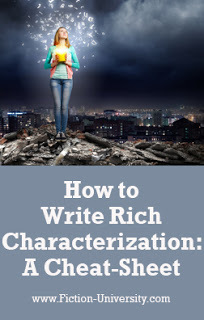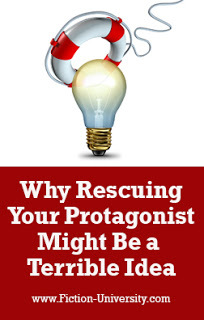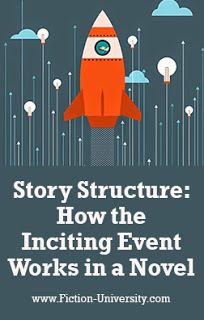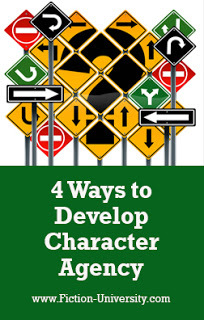Janice Hardy's Blog, page 29
February 18, 2021
How to Write Rich Characterization: A Cheat-Sheet
 By Bonnie Randall
By Bonnie RandallPart of The How They Do It Series
JH: Wonderfully rich characters typically leads to a wonderfully rich novel. Bonnie Randall shares tips on how to reveal the depth and richness of your characters.
A character is infinitely more than just who the author says they are. Like their living, breathing counterparts, fictional characters often reveal themselves in incidental ways.
Here are five quick ways to help readers make powerful inferences about your characters:
1. Weave In Subtle Tells
My mom used to say you could see everything you needed to know about a man just by looking at his shoes, a crazy philosophy that actually holds water. Preferences and choices reveal much about who we are, where we come from, what we value…and what we don’t. Our clothes, music, art, vehicles, etc, are often as revealing as our actions and words. Continue ReadingWritten by Janice Hardy. Fiction-University.com
Published on February 18, 2021 03:56
February 17, 2021
4 Mistakes that Doom the First Page of Your Manuscript
 By Janice Hardy, @Janice_Hardy
By Janice Hardy, @Janice_Hardy Your novel’s first page is the last chance you get to hook your reader.
Writing your first page might be one of the scariest moments in writing a novel. So much is riding on it, and that’s a lot of pressure to deal with while you’re trying to craft the perfect opening line, or find the right voice for the story.
First off, relax.
Yes, the first page is important, but you don’t have to get it right on a first draft, or any draft until the final draft. You have plenty of time to craft a first page that will wow readers, agents, and editors. Many writers don’t even know what the right first page is until they’re written the end of the book.
But don’t ignore it either, because first pages really are as critical as everyone says. No matter how awesome the idea for a novel sounds, if you read that first page and it’s a total dud—you don’t read on. And if a reader is peeking into your novel to see if it hooks them, and it doesn’t, bye-bye sale.
Continue ReadingWritten by Janice Hardy. Fiction-University.com
Published on February 17, 2021 03:00
February 16, 2021
How to Fan Your Short Story Idea Sparks into a Bright Fire
 By Rayne Hall, @RayneHall
By Rayne Hall, @RayneHallPart of the Focus on Short Fiction Series
JH: When you've trained yourself to think "big" when creating story ideas, it can be hard to think "short." Rayne Hall shares tips and questions on how to turns your idea sparks into stories.
How often have you thought, "I want to write a story about this”—and then waited for the muse to come? You may have visited an intriguing place, listened to a friend's marital vows, chuckled about a social media post, or heard about an astonishing true-life event. These ideas are like sparks, hot, bright and fascinating—but how do you get from idea to story, from a mere spark to a bright flame?
Staring at the spark, waiting for the muse to come and fan it into a fire, rarely works. The sparks die, and all that's left is a cold crumb of ember. To build a fire, you need tinder (crumpled newspaper, birch bark, cotton wool balls) which ignites when touched by a spark. Without tinder, you won't get a flame, and without a flame, you can't light the kindling which sets the logs on fire.
Continue ReadingWritten by Janice Hardy. Fiction-University.com
Published on February 16, 2021 03:51
February 15, 2021
Why Rescuing Your Protagonist Might Be a Terrible Idea
 By Janice Hardy, @Janice_Hardy
By Janice Hardy, @Janice_Hardy It’s fun to get your protagonist into trouble, but before you do, consider how they might get out of it.
I enjoy putting my protagonists in terrible danger, and throwing them into situations they can’t easily get out of. Which is both a lot of fun, and a whole pile of frustration, because sometimes I don’t know how to get them out of that trouble. I’m one of those writers who likes to write into a corner and force myself to come up with more unpredictable solutions, which make for better scenes.
Except when it makes for a worse scene.
Back when I was working on my Healing Wars trilogy, I faced this situation multiple times. My protagonist, Nya, gets captures a lot. So I had to get her out of that jam a lot.
The first idea that always popped into my head was to have another character come to her rescue, but I discarded it almost immediately every time.
Continue ReadingWritten by Janice Hardy. Fiction-University.com
Published on February 15, 2021 03:00
February 13, 2021
WIP Diagnostic: Is This Working? A Closer Look at a YA Suspense First Page
 Critique by Janice Hardy, @Janice_Hardy
Critique by Janice Hardy, @Janice_Hardy WIP Diagnostics is a weekly column that studies a snippet of a work in progress for specific issues. Readers are encouraged to send in work with questions, and we diagnose it on the site. It’s part critique, part example, and designed to help the submitter as well as anyone else having a similar problem.
If you're interested in submitting to WIP Diagnostics, please check out these guidelines.
Submissions currently in the queue: One
Please Note: As of today, critique slots are booked through February 20.
This week’s questions:
1. Is this opening working?
2. Is there enough emotion?
Market/Genre: Young Adult Suspense
Note: This is a revision of a previous submission. Here’s the original if you’d like to see how the author revised.
On to the diagnosis…
Continue ReadingWritten by Janice Hardy. Fiction-University.com
Published on February 13, 2021 04:40
February 12, 2021
Story Structure: How the Inciting Event Works in a Novel
 By Janice Hardy, @Janice_Hardy
By Janice Hardy, @Janice_Hardy The opening scene isn’t the real start of your story. The inciting event is.
The inciting event is one of my two favorite turning points in a novel (the other is the midpoint). It’s that moment at the top of a roller coaster just before it tips forward and races into a spiral. It’s when all the fun and excitement you’d been anticipating while waiting in line is about happen.
Sure, the first line, the first page, and the first chapter get most the attention, but they’re only the first things readers see, not where the story begins. First pages are the setup for the real story, and the bridge that connects the opening scene to the inciting event.
And that’s when things really take off.
Continue ReadingWritten by Janice Hardy. Fiction-University.com
Published on February 12, 2021 03:00
February 11, 2021
6 Ways to Fit More Story in Less Space
 By José Pablo Iriarte, @LabyrinthRat
By José Pablo Iriarte, @LabyrinthRat Part of the Focus on Short Fiction Series
JH: Hemingway’s famous “six-word story” proves you can pack a lot of story into a small amount of space. José Pablo Iriarte share six tips on creating depth in short fiction.
When I have conversations with other authors about writing and selling fiction—particularly when I'm talking with folks who are aware of my magazine and anthology sales—I often hear novelists say some variation of "I couldn't write short fiction to save my life! It's so hard to get a whole story in such a small space!" Often there seems to be an implication that some people are born short story writers and some are not, which is where I take exception.
Because the thing is, I also used to believe that I just wasn't born with the knack for writing short. Back around 2012, before I made my first sale, at my writing group's first meeting of the new year, when we discussed our writing resolutions, I remember how mine was to figure out how to write a story of under five thousand words. This was something I had never yet succeeded in doing. In the years since, I've sold nearly thirty short stories to top spec fic markets, been nominated for awards, and generally come to be known as a short story writer.
Continue ReadingWritten by Janice Hardy. Fiction-University.com
Published on February 11, 2021 03:00
February 10, 2021
Fiction University Has a New Column: Focus on Short Fiction!
 By Janice Hardy, @Janice_Hardy
By Janice Hardy, @Janice_Hardy Short fiction used to just be short stories, but these days, shorter works are a vital part of an author’s body of work.
This site has mostly focused on novels in the past, but that’s about to change. Short fiction is a growing market, and one that writers should seriously consider, even if they’re not a short story writer.
Because short fiction isn’t just about short stories.
Short fiction is a way to release more stories to your readers.
Look at your favorite authors—odds are they have novellas mixed in with their series, side stories that weren’t focused on in the main storyline, or tales told from secondary characters. Maybe they’re prequels or epilogues for fans who want to know more about the characters they love.
Continue ReadingWritten by Janice Hardy. Fiction-University.com
Published on February 10, 2021 03:00
February 9, 2021
6 Steps to Fast and Easy Revision
 By Laurence MacNaughton, @LMacNaughton
By Laurence MacNaughton, @LMacNaughtonPart of The How They Do It Series
JH: The first draft is only the first step of a novel, and the revision is where the fun (and work) really begins. Laurence MacNaughton shares an easy plan for revising your novel.
Some writers love to revise their work. At least I assume so. I've never met any. That's why I try so hard to make the entire revision process as painless and quick as possible. Let's face it, the process of revising an entire novel can seem impossibly daunting. And while it is a lot of work, it's not impossible.
Here's how to break it down into manageable chunks so you can get your revisions done faster and easier than ever before.
1. Before you start changing anything, decide which changes you're going to make.
Don't just dive in and start making changes one by one, or you could end up getting lost in the details. Instead, take a step back and evaluate the feedback you've received so far.
Continue ReadingWritten by Janice Hardy. Fiction-University.com
Published on February 09, 2021 03:12
February 8, 2021
4 Ways to Develop Character Agency
 By Janice Hardy, @Janice_Hardy
By Janice Hardy, @Janice_Hardy Many novels fail because their protagonist lacks agency.
Early on in my writing career, I’d never heard the term “agency.” Then I started hearing it everywhere. I suspect I’d crossed a learning threshold and had begun reading more advanced blogs and books, and had stumbled into a higher level of writing advice than I had previously seen.
To paraphrase regular guest author, Rochelle Melander, I had leveled up as a writer.
These days, I hear folks talking about agency all the time, and the word has become part of my writing vocabulary. But I’d bet plenty of other writers still encounter it and have no idea what it is, or they get the general gist of it in context, but aren’t really sure what to do with it.
Imagine my shock when I realized I’d never once written about it here. 3,000 articles on this site, and not a single one on character agency.
Continue ReadingWritten by Janice Hardy. Fiction-University.com
Published on February 08, 2021 04:19



